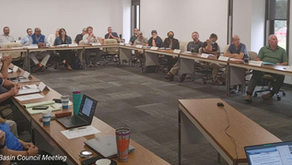Fabulous Facilitation: Pre-Session Exchange Is Essential for Meaningful Outcomes
- JD Solomon
- Jan 14, 2022
- 2 min read
Updated: Jan 21, 2022

"I really liked the pre-workshop survey," responded an executive team member. "It enabled us to have a fast start and it helped everyone get on the same page."
No one wants to waste their time. As the leader of any workshop or series of meetings, it is crucial to understand what is effective and what is not. A well-executed pre-session exchange is one of the most frequently cited things that make a facilitated session more efficient, more effective, and more collaborative.
Defined
A pre-session exchange involves the facilitator (session leader) collecting information for the participants in advance of the session. The exchange usually takes place via face-to-face interviews, phone interviews, or online surveys. The pre-session exchange should be planned and structured in a manner equal to planning and structuring the main session.
Desired Outcomes
Some specific outcomes of the pre-session exchange include:
Better rapport between session leader and participant
Understanding of participant experience and preferences with facilitated sessions
Understanding of participant experience in the subject matter
Collection of subject matter information
Confidential perspective on potential challenging aspects and troublesome participants
Strength and Weaknesses of Each Major Approach
Face-to-face interviews provide the best opportunity to build rapport, see first-hand the participant's work environment, and collect additional data or information that improves the session. The primary negative is that this approach is the most resources intensive. Practically speaking, not every facilitated session rises to the level of needing face-to-face pre-session exchanges.
Phone (or virtual) interviews provide the opportunity for some personal interaction with a moderate level of resources. The negatives include the loss of body language, which can lead to defensiveness or misunderstanding. Practically speaking, this approach is the most common but also the most problematic- not everyone is a good phone interviewer/interviewee and this approach is often chosen just to check the boxes.
Online surveys provide the most subject matter perspective, easily generate quality graphics with a neutral look, and are perceived to require the least interpretation. The biggest negative is that you lose the opportunity to develop rapport and personal insights before the main session. Other negatives include that developing meaningful surveys requires training, it takes quite a bit of time to create a meaningful, concise survey, and digesting the results takes much more effort than merely pushing a few buttons. Practically speaking, plan on the same level of effort for a pre-session survey as would be required for face-to-face interviews, absent major travel time.
What to Do
Plan with Executive Sponsor the approach, scope, and expectations of the pre-session exchange
Develop a realistic timeline (usually 4 to 8 weeks before the facilitated session)
Visualize how the pre-session exchange information will be used in the facilitated session
Develop questionnaire and survey
Execute the approach
Share and discuss pre-session exchange information with the executive sponsor
Share pre-session exchange information with participants before the facilitated session
Open the facilitated session with the pre-session information
Pre-Session Exchanges
A well-executed pre-session exchange is one of the most frequently cited things that makes a facilitated session more efficient, more effective, and more collaborative. A well-executed pre-session exchange produces better outcomes. No one wants to waste their time.
JD Solomon Inc provides facilitation at the nexus of facilities, infrastructure, and the environment. Contact us for more information about facilitation services ranging from Strategic Plans and Board Retreats to Criticality Analysis, Root Cause Analysis, and Capital Program Development.




Comments